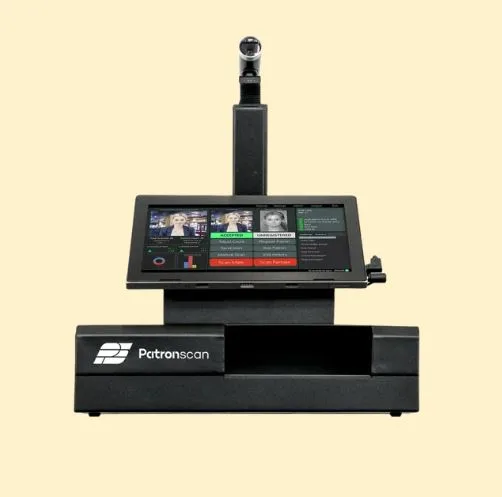How ID Scanner Technology Helps Fight Counterfeit IDs and Fraud
ID scanner technology plays a critical role in detecting counterfeit IDs and preventing fraud by using advanced features like real-time validation and AI assisted authentication. These systems support businesses in verifying identities accurately, reducing risks associated with fake ID usage. From bars to retail establishments, industries rely on secure scanning solutions to enhance safety and streamline the id verification process while combating identity fraud effectively.
Table of Contents
- How ID Scanner Technology Works to Detect Fake IDs
- Key Features of an Effective Age Verification Device
- Industries That Benefit Most from Advanced ID Scanners
- Final Thoughts on Choosing the Right ID Scanner for Fraud Prevention
In an era where counterfeit IDs and identity fraud are becoming increasingly sophisticated, businesses face significant challenges in verifying customer identities. From hospitality venues to retail stores, the ability to detect fake IDs is no longer just a matter of compliance – it’s a necessity for safety and operational integrity. Advanced tools like id scanner technology have emerged as a reliable solution, offering real-time validation and enhanced security measures.
With features such as remote management and cross-industry alerts, modern id scanner systems provide businesses with the tools they need to combat fraud effectively. These innovations not only streamline operations but also support industries in maintaining trust and safety. As counterfeit methods evolve, understanding how these technologies work and their applications becomes essential for any business prioritizing security and authenticity.
How ID Scanner Technology Works to Detect Fake IDs
Counterfeit IDs are designed to deceive, but modern id scanner technology employs a combination of advanced methods to identify fraudulent documents. Understanding how these systems function can help businesses make informed decisions about implementing them.
The Verification Process Explained
At its core, an id scanner system works by extracting and validating encoded data from the ID and cross-referencing it across a sequence of validation algorithms. This process involves:
- Bar Code and Magnetic Stripe Scanning: Most IDs contain barcodes or magnetic stripes that store critical information. The scanner reads this data and compares it against known formats for authenticity. For jurisdictions that utilize this technology, and allow for scanning as part of their privacy regulations, Patronscan integrates analysis of this security feature.
- Optical Character Recognition (OCR): OCR technology identifies text on the ID and verifies its alignment with standard layouts, flagging discrepancies.
- Real-Time Validation: Advanced systems connect to secure servers to validate the ID’s status in real time, ensuring it hasn’t been reported or flagged across the network.
Why Fraud Detection Matters
Fraudulent IDs pose significant risks, including underage access, identity theft, and financial losses. By leveraging digital age verification tools, businesses can mitigate these threats effectively. For instance, industries such as hospitality and retail rely on robust counterfeit id detection measures to protect their operations and reputation.
When evaluating options, businesses often ask: What makes the best fake id scanner stand out? The answer lies in its ability to combine speed, accuracy, features, and advanced fraud detection features. Systems that offer real-time validation, AI-based authentication, and compatibility with multiple ID types are considered top-tier solutions. These features not only combat fraud but also streamline the id verification process, saving time and resources for businesses.
Key Features of an Effective Age Verification Device
When selecting an age verification device, businesses must consider the features that contribute to accuracy, reliability, and ease of use. These devices are designed to address the challenges of counterfeit IDs and identity fraud while guaranteeing compliance with industry regulations. Below are the standout features that define a robust solution.
1. Real-Time ID Validation
Real-time validation is a cornerstone of effective id scanner technology. This feature allows businesses to instantly verify whether an ID is authentic or flagged in databases. Key aspects include:
- Immediate feedback on the ID’s status (e.g., valid, expired, or flagged).
- Support for multiple ID types, including passports, driver’s licenses, and national IDs.
- Regular updates to their database of known fake ID types.
2. Advanced Fraud Detection Mechanisms
Modern scanners employ cutting-edge technologies to detect even the most sophisticated fake IDs. But how to know if fake id scans are accurate? Systems use the following methods:
- AI-Based Authentication: Machine learning algorithms analyze patterns in ID design, fonts, and holograms to spot anomalies.
- Hologram and UV Light Detection: Many IDs contain security features visible only under ultraviolet light, which scanners can identify.
- Tamper-Proof Scanning: Makes sure that altered or tampered IDs are flagged during the scanning process.
3. Remote Monitoring and Analytics
For businesses operating across multiple locations, remote monitoring capabilities are invaluable. These features allow centralized oversight of all devices, providing:
- Performance metrics, such as scan success rates and error logs.
- Alerts for flagged IDs across establishments, enhancing cross-industry security.
- Data insights to optimize operations and improve fraud prevention strategies.
4. User-Friendly Interface
Ease of use is critical for seamless integration into daily workflows. The best systems offer:
- Intuitive touchscreen displays and straightforward navigation.
- Minimal training requirements for staff.
- Compatibility with existing hardware, reducing setup costs.
By prioritizing these features, businesses can implement secure scanning solutions that not only combat fraud but also enhance operational efficiency.
Industries That Benefit Most from Advanced ID Scanners
The adoption of id scanner technology extends far beyond a single sector, as businesses across various industries face unique challenges related to identity verification. From preventing underage access to mitigating fraud, these systems provide tailored solutions that address specific needs. Below, we explore the industries where advanced scanners have proven most impactful.
1. Hospitality: Bars, Nightclubs, and Restaurants
In hospitality, guaranteeing patrons meet age requirements is critical to compliance and safety. For example:
- Bars and nightclubs rely on age verification devices to prevent underage drinking, avoiding hefty fines and reputational damage.
- Restaurants serving alcohol use scanners to streamline entry checks during peak hours, enhancing both security and customer experience.
- The ability to detect fake id prevention tools makes sure that staff can focus on service rather than manual ID inspections.
2. Retail: Liquor Stores and Regulated Product Retail Sectors
Retailers in regulated industries depend on accurate ID verification to adhere to legal standards:
- Liquor stores utilize id scanner systems to confirm customer ages and maintain strict compliance with local laws.
- Regulated product retail sectors face stringent legal requirements for verifying buyer eligibility. Advanced id scanner systems help these businesses ensure compliance by validating IDs quickly and accurately.
- By reducing human error, these scanners help retailers avoid costly penalties and operational disruptions.
3. Event Management and Entertainment Venues
Large-scale events and entertainment venues require efficient crowd management and security measures:
- Concerts, festivals, and sporting events use digital age verification to expedite entry while making sure attendees meet age restrictions.
- Scanners also help identify individuals flagged for prior misconduct, promoting safer environments.
- The speed and accuracy of modern systems support high-volume scanning without long queues.
Patronscan has robust reporting capability for Event/Venue operators. This helps improve ROI on Marketing and Operational investments.
4. Commercial Establishments: Access Control and Banking
Beyond traditional retail and hospitality, other sectors leverage secure scanning solutions for diverse applications:
- Office buildings and co-working spaces use scanners for secure access control, verifying employee or visitor identities.
- These systems enhance trust and accountability in settings where security is paramount.
By addressing industry-specific pain points, id scanner technology has become an indispensable tool for businesses prioritizing safety, compliance, and operational efficiency.
Final Thoughts on Choosing the Right ID Scanner for Fraud Prevention
Implementing id scanner technology is a proactive step toward safeguarding businesses against counterfeit IDs and fraud. By leveraging advanced features like real-time validation, AI-based detection, and remote monitoring, organizations can enhance security while ensuring compliance with industry standards.
Industries ranging from hospitality to retail benefit significantly from these systems, which streamline operations and protect against financial and reputational risks. As businesses navigate evolving challenges, adopting robust id verification processes becomes essential for maintaining trust and operational integrity.




